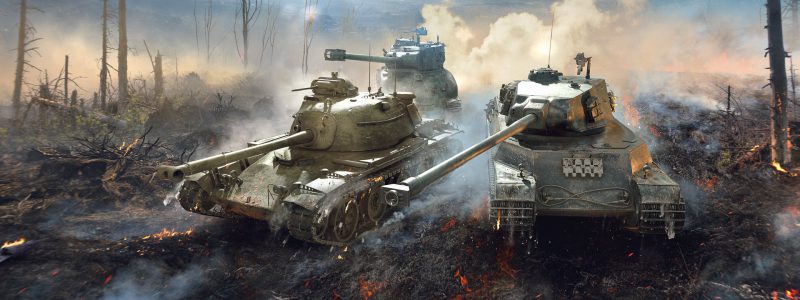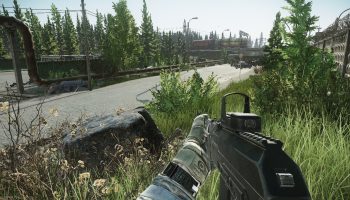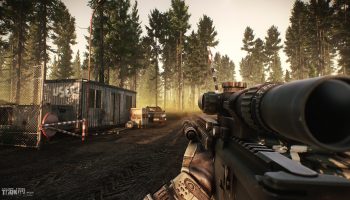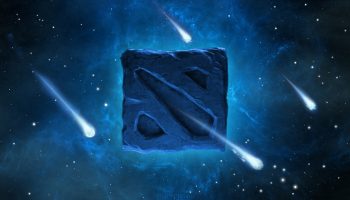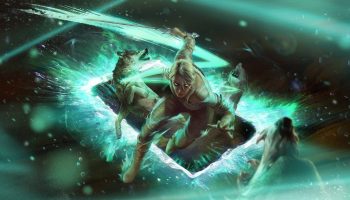Wargaming has given us the Field Modifications system, supposedly to specialise vehicles by having to pick between two choices depending on tank class. Having wasted quite a bit of time on Field Modifications on , I seem to have found some objectively optimal choices in each and every case. Do you have some better ideas? Are there any tanks that violate these general guidelines? Are there some cases where the winning move is not to play? Am I a complete scrub who should shut up? Post it all below!
Note: guide is writen by dummy, for dummy. Dummy. Dum. Dum.
tl;dr:
- All-terrain suspension for heavies;
- Reinforced suspension and right-angle periscope for tank destroyers;
- Please stop playing artillery;
- Playstyle determines the rest.
Light tanks
Test vehicle: T-100 LT
Level II: Setup 1 offers more powah, setup 2 offers a higher top speed. Since more power means better acceleration and rotation, setup 1 is usually the best choice on lights limited in this regard – although setup 2 allows you ludicrous speed builds. Your choice.
Level IV: Straight up choice between DPM and dispersion. DPM would generally be the better choice, since dispersion rarely limits DPM in lights (but DPM does) so I'd go for the loading mechanism.
Level V: Relatively inconsequential: if you're reversing or getting shot in a light, you're doing it wrong. I'd go for the reinforced spalling protection given how little I find myself reversing in a light and if I am, rarely do I find the reverse speed a limit.
Level VII: Mostly a wash given that a tank equipped with one will (as far as I can calculate using Camo Calculator) spot the tank equipped with the other at the same distance. This means it's a matter of active versus passive scouting, with active scouts benefitting from the view range and passives enjoying the camo benefits.
Level VIII: Given that it is already easy to spot moving tanks that are not behind bushes and much harder to spot bushcampers, the narrow-angle observation device is the best choice here.
Medium tanks
Test vehicle: STB-1
Level II: I can't imagine sitting in a tank with a damaged gun or ammo rack thinking 20% dispersion or 50% more DPM would solve the problem- but 4% more traverse speed is definitely nice. Might not want the light-alloy mounting points in something as flammable as an Obj. 430U, though.
Level IV: Accurate DPM tending to be dispersion-limited, suspension arm tuning seems to be the superior choice unless you are constantly trying to keep 445 meters away from the enemy.
Level V: Fixing your headlights gives a very, very significant boost to camouflage. Unless you're constantly brawling (getting your suspension damaged) and peek-a-booing (requiring reverse speed) get you the latter option.
Level VII: Taking a hit on top speed is a big one, but can be compensated for with a turbo. Taking a hit on view range is a big one, but can be compensated for with optics. Depends on playstyle, I'd edge it towards view range for most crews.
Level VIII: Track HP is not enough to reliably resist incoming hits, so the trick on all mediums here is not to get hit in the tracks. I'd go for the lightweight support rollers.
Heavy tanks
Test vehicle:
Level II: All. Terrain. Suspension. Yes, it reduces tank traverse – but then the decreased resistances mean the practical tank traverse is higher and you get better overall resistances and more track HP. No-brainer.
Level IV: Better aiming speed means a practically smaller reticle unless you are fully aimed – and if you're sniping with most heavies, you're doing it wrong. Aiming gears lapping it is.
Level V: Obviously you would want less stun in a superheavy like a Maus, but if you are spotting in a heavy things are getting desperate. Go for sound insulation unless you have a bad crew.
Level VII: Completely situational. On some tier X heavies 2 km/h is a whopping 16% and this may be very significant for peek-a-boo tactics, on some it's ''just'' 10%, so you be the judge.
Level VIII: 15% HE damage reduction is very significant, 4% dispersion is not so much (and can be easily compensated using equipment/crew). Stack it with a spall liner, put on some Ben Hur and get to ramming!
Tank destroyers
Test vehicle: Object 268 version 4
Level II: Reinforced suspension, just like with the heavies. I suspect Wargaming will nerf these two oversights in the future, but let's keep enjoying it for now.
Level IV: Given that tank destroyers tend to not be the brawly type most would likely want a smaller final reticle (parallax adjustment). However, if you're in a turretless bruiser the aiming gears lapping may be preferable.
Level V: Concealment after firing? 6%? What a joke. Get a right-angle periscope: improving your view range is a much better way to not get lit up, as is using bushes, your brain, a fair amount of distance and the lot.
Level VII: Assuming a pure fight of DPM versus HP, 3% more DPM is 50% more improvement than 2% more HP. The 2% more HP may not save you from death, but 3% more DPM is always useful. Only consider the passive safety system if you are deliberately getting shot at alot, which not all tank destroyers should.
Level VIII: Reverse speed is useful for peeking around a corner, which a turretless tank destroyer will rarely do. Turreted tank destroyers will rarely find themselves brawling around said corner so they also will not benefit. The increase power of the repairable tracks edges it out for me. Also, how do tracks increase power?
Artillery
Test vehicle: Object 261. May contain sarcasm.
Level II: Dispersion is artillery's enemy, which means you should pick the engine tweaking so you will miss my tank.
Level IV: If you are spotted as arty, you are already going to drown/flip/kill yourself. So please get that Hunter C suite, so you don't get in position to shoot me but at least you won't get spotted!
Level V: With a wide firing arc (BC 155, Conq GC) you are travering the gun a lot,, with a narrow firing arc (GW E100, Obj. 261, T92) you are traversing the hull a lot,. Please select setup 1 for the former and setup 2 for the latter.
Level VII: Ambivalent to me, although a 3% improvement in all DPM may not outweigh a 3% improvement in a component of the practical improvement of DPM. Aiming mechanism tuning I guess?
Level VIII: If you are getting hit by counterbattery fire at tier X, you deserve it – and your crew deserves protection! Increase survivability so you take too long to aim and miss my tank.
This post may or may not be taking advantage of Cunningham's law to determine the posters' tank setup.
Source: https://www.reddit.com/r/WorldofTanks/comments/poa8lw/dummies_guide_to_field_modification/



